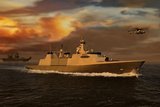Indonesia has approved extra funding for the country’s newly-established Maritime Security Board (Bakamla), which has been given greater powers than its predecessor.
The monetary boost approved by the House of Representatives amounts to US$56.5 million, on top of what was already allocated in the 2015 budget.
Tedjo Edhy Purdijatno, Coordinating Minister for Political, Security, and Legal Affairs, had pleaded for more money to support Bakamla, which was established on 13 December 2014.
Possessing more powerful authority to coordinate at an operational level, this organisation replaced the Indonesian Maritime Security Coordinating Board (Bakorkamla). Bakamla is supposed to carry out coastguard tasks






















